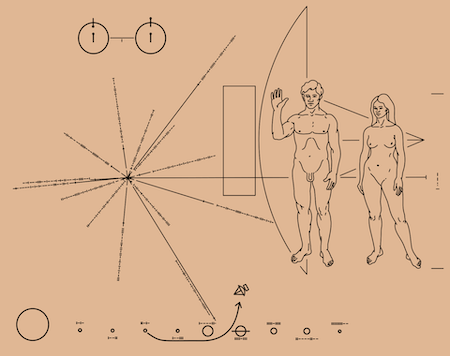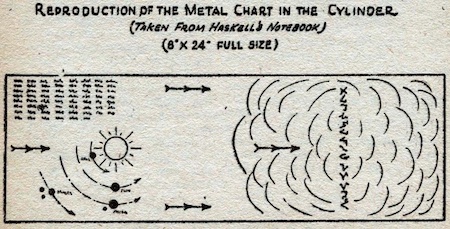Science Fiction
Dictionary
A B C D E F G H I J K L M N O P Q R S T U V W X Y Z
Europa Clipper Plate Carries A Special Message

NASA sends a new mission from one ocean world to another - the Europa Clipper spacecraft - and continues a tradition that started with the Pioneer Plaque and the Voyager's Golden Record. And an even longer tradition in science fiction!
Water connects all life as we know it, and all human cultures. The outward-facing side of the vault plate features "Water Words" — a visual representation of the word for water in 103 spoken languages, extending from a central symbol that represents the sign for water in American Sign Language. Professional linguists helped to collect a diverse and inclusive sampling of human language families from across the globe. Audio recordings of these words are engraved on the vault plate as waveforms – visual representations of each sound.
Water connects our planet Earth with Jupiter's moon Europa. The Europa Clipper mission aims to confirm that a vast ocean exists beneath Europa's icy surface, making it a promising place to study habitability for life beyond Earth. This shared element of water inspired the Europa Clipper team to engrave designs that celebrate human connections and our collective spirit of exploration on a triangular metal plate. The plate, made of tantalum metal about 1 millimeter thick and about 7 by 11 inches (18 by 28 centimeters), is part of the structure that will protect Europa Clipper’s electronics from Jupiter’s harmful radiation.
(NASA's Europa Clipper vault plate in 3D)
This is an early precursor to the Pioneer plaques:
The Pioneer plaques are a pair of gold-anodized aluminum plaques that were placed on board the 1972 Pioneer 10 and 1973 Pioneer 11 spacecraft, featuring a pictorial message, in case either Pioneer 10 or 11 is intercepted by intelligent extraterrestrial life. The plaques show the nude figures of a human male and female along with several symbols that are designed to provide information about the origin of the spacecraft.
(The Pioneer plaque)Science fiction fans may recall the metal message in space from The Menace From Space, by John Edwards, published by Wonder Stories in 1934:
“Seems to have been rolled up some time, to judge from the spring in it," observed Haskell. Morrison nodded. “That is not surprising, if it comes from the place I surmise.” Bradbury, who had temporarily forgotten even his beloved red moss in this new development, looked at him inquiringly, but Morrison was concentrating upon the sheet of inscriptions. This was about eight inches wide, and had unrolled to a length of two feet or so. Near the left-hand edge as they looked at it was inscribed a disc which, from the multitude of rays emanating from it, might be taken to represent the sun. Very close to this was a tiny circle, while three slightly larger discs were shown at varying distances of a few inches. Extending across the full width of the right-hand end of the sheet, rvas a series of curved scratches upon which was super-imposed a vertical arrangement of strange letters. A similar series of vertical characters in several columns, and of smaller size, occupied the top left corner.
(The alien chart from 'The Menace From Space' by John Edwards)Similar printing, if such it was, labeled each small disc.
Over all, on the left, right, top, and bottom of this strange “chart" were four great symbols which could be taken for nothing else but a variation of arrow-heads, indicating direction.
There was a dead silence for several minutes in the library, while each man formed his own conclusions about the queer chart before them. Then Morrison heaved a great sigh as he stood back from the table.
“There,” he said impressively, “you have a universal cryptogram — yet it is one which can be interpreted by any intelligent creature on any planet in the Solar System! The printing we cannot interpret straight away — but that matters little. The sketch is self-explanatory; that is, to anyone endowed with average intelligence.”
Scroll down for more stories in the same category. (Story submitted 3/16/2024)
Follow this kind of news @Technovelgy.| Email | RSS | Blog It | Stumble | del.icio.us | Digg | Reddit |
Would you like to contribute a story tip? It's easy:
Get the URL of the story, and the related sf author, and add it here.Comment/Join discussion ( 0 )
Related News Stories - (" Spacecraft ")
Europa Clipper Plate Carries A Special Message
'...a universal cryptogram — yet it is one which can be interpreted by any intelligent creature on any planet in the Solar System!' -China Wants To Build Mega Space Ships
'Don't do anything to endanger our shipping privileges...' - Frank Herbert, 1965.Dream Of Building Your Own Rocket?
Fiorello Bodoni, you inspire all of us.Used Dragon Cargo Spacecraft Will Fly Again
'the overstrained meters made the smaller craft skittish as a young horse...' - Robert Heinlein
Technovelgy (that's tech-novel-gee!) is devoted to the creative science inventions and ideas of sf authors. Look for the Invention Category that interests you, the Glossary, the Invention Timeline, or see what's New.
Science Fiction
Timeline
1600-1899
1900-1939
1940's 1950's
1960's 1970's
1980's 1990's
2000's 2010's
Current News
The New Habitable Zones Include Asimov's Ribbon Worlds
'...there's a narrow belt where the climate is moderate.'
Can One Robot Do Many Tasks?
'... with the Master-operator all you have to do is push one! A remarkable achievement!'
Atlas Robot Makes Uncomfortable Movements
'Not like me. A T-1000, advanced prototype. A mimetic poly-alloy. Liquid metal.'
Boring Company Drills Asimov's Single Vehicle Tunnels
'It was riddled with holes that were the mouths of tunnels.'
Humanoid Robots Tickle The Ivories
'The massive feet working the pedals, arms and hands flashing and glinting...'
A Remarkable Coincidence
'There is a philosophical problem of some difficulty here...'
Cortex 1 - Today A Warehouse, Tomorrow A Calculator Planet
'There were cubic miles of it, and it glistened like a silvery Christmas tree...'
Perching Ambush Drones
'On the chest of drawers something was perched.'
Leader-Follower Autonomous Vehicle Technology
'Jason had been guiding the caravan of cars as usual...'
Golf Ball Test Robot Wears Them Out
"The robot solemnly hit a ball against the wall, picked it up and teed it, hit it again, over and again...'
Boring Company Vegas Loop Like Asimov Said
'There was a wall ahead... It was riddled with holes that were the mouths of tunnels.'
Rigid Metallic Clothing From Science Fiction To You
'...support the interior human structure against Jupiter’s pull.'
Is The Seattle Ultrasonics C-200 A Heinlein Vibroblade?
'It ain't a vibroblade. It's steel. Messy.'
Roborock Saros Z70 Is A Robot Vacuum With An Arm
'Anything larger than a BB shot it picked up and placed in a tray...'
A Beautiful Visualization Of Compact Food
'The German chemists have discovered how to supply the needed elements in compact, undiluted form...'
Bone-Building Drug Evenity Approved
'Compounds devised by the biochemists for the rapid building of bone...'


